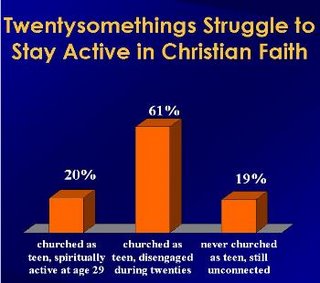Young Adults Leaving the Church

In an ongoing discussion about young adults leaving Christianity, the Barna Research Group reports this week that "despite strong levels of spiritual activity during the teen years, most twentysomethings disengage from active participation in the Christian faith during their young adult years." The report states that six out of 10 twentysomethings involved in a church during their teens fail to actively pursue Christ into their early adult years. Not only are twentysomethings vacating the church, the report states, they are also not returning. I find this trend, as well as the attitude behind it, disturbing:
Loyalty to congregations is one of the casualties of young adulthood: twentysomethings were nearly 70% more likely than older adults to strongly assert that if they “cannot find a local church that will help them become more like Christ, then they will find people and groups that will, and connect with them instead of a local church.” They are also significantly less likely to believe that “a person’s faith in God is meant to be developed by involvement in a local church.”
While churches may be partially to blame for failing to retain young adults, young adults themselves are also guilty. Jesus loves the church. Ephesians 5 informs us that Christ intimately loves and cares for the church; He has chosen her as His bride — His partner. ("This is a great mystery," Paul says.) Spiritual gifts are meant to be exercised to strengthen the church (1 Corinthians 14). Abandoning the church equates to divorcing Christ. This statement may sound inflammatory, but the privatization of faith — the idea that I can be a Christ follower free from the accountability of a body of believers — is not a biblical concept. And the fallout is evident.
Recognizing the damage has already been done in the current twentysomething generation, David Kinnaman, the director of the research, suggests focusing efforts on teens. Speaking of strategies churches need to employ, he says:
Another shift, is to develop teenagers’ ability to think and process the complexities of life from a biblical viewpoint. This is not so much about having the right head knowledge as it is about helping teens respond to situations and decisions in light of God’s principles for life.
Perhaps it's not too late for twentysomethings to do the same. And passing through the doors of the church is the first step.



4 Comments:
Other than simply quoting from the Bible the importance of church attendance (Heb 10:25, 1 Cor 12) I wanted to mention studies trying to explain the mass church exodus.
The University of Michigan's Institute for Social Research, World Values Study definitely shows trends that religious activity is directly correlated to age and how "rich" a society is.
http://www.umich.edu/news/index.html?Releases/2004/Sep04/r092104
http://www.umich.edu/news/index.html?Releases/2004/Sep04/charts
The irony though is that despite a country's lethargic participation in religion, the majority of its population still thinks a lot concerning the "deeper issues" in life:
"But even in advanced industrial societies, Inglehart emphasized, evidence from the World Values Surveys indicates that a growing percentage of the public spends time thinking about the meaning and purpose of life. 'Organized religion is losing its grip on the public, but spiritual concerns, broadly defined, are taking on growing importance.' (Inglehart)"
These studies confirm what the Bible says: That we all sense that the pursuit of pleasure and wealth won't satisfy (Ecc 2:10-11) and that those who need little have little need for God (Luke 18:24-26) while those who need much have only God to turn to (Psalm 40:17). Combine abundant wealth, strong individualistic values, weak parental guidance, and the young adult "invincibility syndrome" and you have the situation we are in.
Btw, I also submitted this answer to the Boundless Typepad blog.
My husband and I have been talking about this very thing! We are in the "twenty-something" category and have noticed how hard it is to connect with outher couples our age as there appear to be so few in church these days!
Of the millions of reasons why this might be here are what appear to be the most across the board trends I've seen:
1. "old folks" trying to run the "young folks" ministries. I can not tell you how many times we've visited the "twenty something" class only to see it is led by a fifty year old man and his wife. Not I totally believe in the advantage, no, the necessity of having mentoring style relationships with people who are older, however these people usually haven't taken the time to find out what draws and what turns off people in our age group. We are a generation who want something genuine and real, we don't have time to beat about the bush and play ring around the rosie around the cross. We want to cut to the heart of the matter, we want to get down into the dirt and mire of our lives. We have big questions and intense struggles and the old models of sunday school are just not going to cut it. We don't want to sip coffee and eat doughnut holes and make small talk, if we wanted that there are plenty of more interesting places to go. When we are at church we want to find others who will pray not only for us but with us, who care deeply and are tenacious about relationships.
2. Alowing college students to drift from their home church. Think about it. There's the teenager in the youth ministry, then they go off to college and become involved in the college ministry, then they come home but to what? To the church that hasn't kept up with them since then, except to say hi when they come home from breaks, and to what ministry? Where is the vibrant group of worshipers, where are the ministry opportunities, where are the leaders supposed to go after college, especially if they aren't called to full-time ministry. I am so frustrated with how the church as a whole seems to overlook people our age, they dismiss our opinions and suggestions, they assume that because they are older they know better. It is infuriating.
3. You are TOTALLY right that it is the responsibility of young Christians our age to be faithful and to push through all the junk to find our place. We have to cultivate a love for the church and try to conform our perspective to Jesus'. We have to recognize the importance of using our gifts in the church, and that it is vital to our spiritual growth.
Thanks for bringing up this topic, those numbers sure do reflect what I've been seeing as we've been looking for a church home for the past year or so.
Faith,
Interesting comments. In your first paragraph you mention that some small group leaders don't pray with you, don't care deeply, and aren't serious about building lasting relationships. I would certainly agree with you that does not show good leadership.
However, in the prior sentences you also state that these "old folks" don't take the time to find out what draws "young folks" in and what turns them off. That too is a valid point but if you'll gorgive me, it seems like this very attitude is part of the problem as well. Refering to elders in the church as "old folks" and saying they aren't "with it" to younger generational interests does not sound like unity in the Body of Christ to me. This kind of mentality can contribute to the 'Us vs. Them' and consumerist problems that exist within the modern church. Perhaps you'd like to clarify what you mean as I could be infering it incorrectly.
I think all of us in a way have adopted this way of thinking whether we are consciously aware of it or not. As one pastor said, "We think 'I give my money to this church so I expect it to meet MY needs. If it doesn't have the type of music, small groups, or sermons I like I'll take my money and go elsewhere'". To be sure, there is some legitimate 'church-shopping' that needs to be done, but I think we shift our appointments too readily.
Post a Comment
<< Home